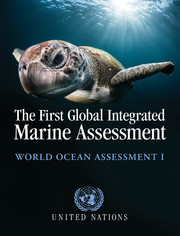Book contents
- Frontmatter
- Dedication
- Epigraph
- Contents
- Foreword and Preface
- Preface
- Summary of the first global integrated marine assessment
- The context of the assessment
- Assessment of Major Ecosystem Services from the Marine Environment (Other than Provisioning Services)
- Assessment of the Cross-cutting Issues: Food Security and Food Safety
- Assessment of Other Human Activities and the Marine Environment
- Assessment of Marine Biological Diversity and Habitats
- Section A Overview of Marine Biological Diversity
- Chapter 36 Overview of Marine Biological Diversity
- Section B Marine Ecosystems, Species and Habitats Scientifically Identified as Threatened, Declining or Otherwise in need of Special Attention or Protection
- I Marine Species
- II Marine Ecosystems and Habitats
- Section C Environmental, economic and/or social aspects of the conservation of marine species and habitats and capacity-building needs
- Chapter 52 Synthesis of Part VI: Marine Biological Diversity and Habitats
- Chapter 53 Capacity-Building Needs in Relation to the Status of Species and Habitats
- Overall Assessment
- Annexes
- References
Chapter 53 - Capacity-Building Needs in Relation to the Status of Species and Habitats
from Section C - Environmental, economic and/or social aspects of the conservation of marine species and habitats and capacity-building needs
Published online by Cambridge University Press: 18 May 2017
- Frontmatter
- Dedication
- Epigraph
- Contents
- Foreword and Preface
- Preface
- Summary of the first global integrated marine assessment
- The context of the assessment
- Assessment of Major Ecosystem Services from the Marine Environment (Other than Provisioning Services)
- Assessment of the Cross-cutting Issues: Food Security and Food Safety
- Assessment of Other Human Activities and the Marine Environment
- Assessment of Marine Biological Diversity and Habitats
- Section A Overview of Marine Biological Diversity
- Chapter 36 Overview of Marine Biological Diversity
- Section B Marine Ecosystems, Species and Habitats Scientifically Identified as Threatened, Declining or Otherwise in need of Special Attention or Protection
- I Marine Species
- II Marine Ecosystems and Habitats
- Section C Environmental, economic and/or social aspects of the conservation of marine species and habitats and capacity-building needs
- Chapter 52 Synthesis of Part VI: Marine Biological Diversity and Habitats
- Chapter 53 Capacity-Building Needs in Relation to the Status of Species and Habitats
- Overall Assessment
- Annexes
- References
Summary
Introduction
Knowledge of the status of species and habitats forms a fundamental basis for understanding biodiversity at all scales (Chapter 34) and ecosystem functions and services (Part III and Millennium Ecosystem Assessment, 2005). This facilitates identifying the capacity-building needs for appropriate interventions that will enhance and promote sustainability. This creates a need for knowledge of marine biological diversity and habitats from a marine ecosystem approach, and of how biodiversity varies in relation to various levels of anthropogenic perturbations. Gaps in scientific knowledge, technological advances, human skills and infrastructure for the conservation of marine biodiversity and habitats are crucial. Part VI addresses these issues focusing on the major oceans in relation to marine ecosystems, habitats and major species groups that are emerging from our assessments as potentially threatened, declining or needing special attention. All these categories need a variety of capacity building, technical skills, technology and infrastructure to address their trends. To facilitate this capacity building, we undertook the identification of knowledge gaps mainly from the Part VI Chapters, and the capacity building needed to address socio-economic issues for human well-being. Chapter 32 and this Chapter both address capacity-building needs. However, whereas the identification of needs in Chapter 32 was based on outcomes of regional workshops and the Chapters of Part V, this chapter is based on all the authored chapters, which also include identification of gaps from literature reviews on the oceans.
To address the objective of the Regular Process to ensure that capacity building and technology transfer are done through promoting cooperation, not only North to South but also South to South cooperation (UNGA, 2010; UNGA/AHWGW, 2009; UNGA/AHWGW, 2010), the synthesis is done in geographical areas following the oceans and the major regional seas addressed in Chapter 36. Further capacity needs were identified in relation to the knowledge gaps from the chapters focused on the overall status of the major groups of species and habitats, including the socio-economic aspects of their conservation.
The marine species groups that were given special attention or protection are: marine mammals, seabirds, marine reptiles, sharks, tuna and billfish. These were dealt with globally without specifically linking them to particular oceans.
- Type
- Chapter
- Information
- The First Global Integrated Marine AssessmentWorld Ocean Assessment I, pp. 923 - 932Publisher: Cambridge University PressPrint publication year: 2017



